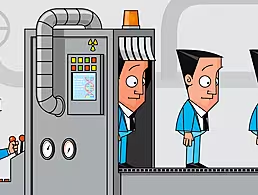You can spend years perfecting your scientific skills and weeks perfecting your CV and applying for jobs. But when you get an interview, how do you make sure you land the job? Hays Recruitment knows the common life science questions and how to answer them well.
So, you’re looking for a new life sciences job. You’ve done all the right things; you’ve written a great CV tailored this for each job, complete with all the key words that managers are looking for. You’ve pruned your LinkedIn profile to perfection, presenting your experience and skills in a way that commands attention for all the right reasons.
And now the interview is upon you and you need to demonstrate you are the best person for the job. The key here is good preparation – here are a few questions we think you should be prepared to answer.
1. Why do you want this position?
Your motivation for applying speaks volumes about the kind of person you are. It’s never a good idea to speak negatively about your current employer, or even your current job. Try instead to express your desire for greater challenges, more responsibility and the opportunity for personal growth. Depending on the job, acknowledging your attraction to burgeoning parts of the industry (eg biopharmaceuticals, medical devices) is natural. And of course, ‘more money’ as a stand-alone reason is a definite no-no. Many candidates in the life sciences sector deem salary secondary to the trials and projects they could be exposed to, so consider this.
2.What do you know about our company?
You need to do your homework on this. Knowing the origins of the company; its history of mergers and acquisitions; and its turnover and projects in the pipeline are vital to a successful interview. Internet research is the place to start, but also draw on your network of contacts, so you’re clear who you’re talking to. Check out the company brochure – if it’s not on the website, phone up and ask for it. A small action like this can reap big rewards. Wiki can also be an extremely valuable tool to understand more, as can leading paperbacks like New Scientist.
3.Why should we employ you?
This question is often code for ‘how will employing you benefit our bottom line?’ Knowing broadly how the business works is a good start and will help you to present an argument for your objective worth. Specific examples of milestones achieved in your current and previous roles will be helpful, and don’t forget to feature your soft skills, such as communication and management abilities.
4.Do you have experience of handling ‘x’ situation?
The golden rule here (and indeed throughout the interview) is to avoid using the word ‘no’. If you haven’t had the relevant experience, say that gaining experience in this area is one of your aspirations. Mention any past experiences that may be similar, or good support, for handling the type of situation in question. The life sciences sector is extremely incestuous and transparent, so honesty is key.
5. Do you know the applicable legislative and regulatory standards?
This will be especially important if you’re applying for work in regulatory affairs, quality assurance or drug safety. You need to make sure you can articulate these without hesitation. Even candidates not in these areas should have a working knowledge of the nature, role and reach of pharmaceutical governance and its related organisations (eg the responsibilities and workings of the European Medicines Agency).
6. What type of work culture do you see yourself succeeding in?
The key to answering a question like this is to understand the different work cultures on offer. If you’re interviewing for a start-up, for example, you should be more comfortable in a ‘riskier’ environment than if you’re applying to a pharmaceutical company. Likewise, if you’re interviewing for a position in a Contract Research Organisation, you should be comfortable with the long hours and the variation that often go with this type of appointment.
Paul Strouts is the global managing director for Hays Life Sciences. Strouts looks after 27 countries within the group’s portfolio, spanning from New York in the US to Sydney in Australia.
A version of this article originally appeared on Hays’ Viewpoint blog.
Looking for jobs in tech or science? Check out our Employer Profiles for information on companies hiring right now.




